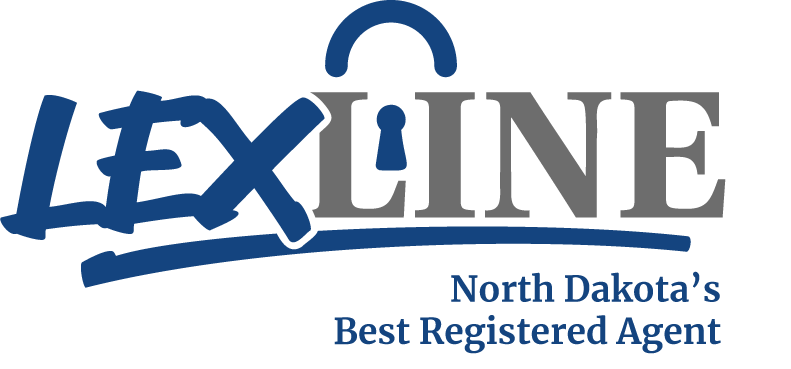Frequently Asked Questions

Do I need a North Dakota Registered Agent?
Benefits of LexLine Corporate Services as your North Dakota Registered Agent. LexLine Corporate Services offers local support for businesses of all sizes located in central North Dakota. LexLine Corporate Services can turn around documents within 24 hours of service. Our address is a public record, offering your business a layer of privacy. Our office will accept possible service of legal documents such as Summons, and you will not need to accept service in front of clients or employees. If LexLine Corporate Services is your registered agent, your business can operate with a P.O. Box address without a physical address. Your business can keep nontraditional business hours without the worry of missing important documents with the potential of a default judgment.Can I be my own registered agent?
Yes, in North Dakota, a business may be its own registered agent as long as they have a valid North Dakota street address.Will you let me know when my North Dakota Annual Report is due?
Yes, if requested, LexLine Corporate Services will notify the business 30 days prior to the Annual Report due date.Can I have my business’s mail delivered to your North Dakota office?
Yes, LexLine Corporate Services offers a mail service with a 24-hour turnaround; packages are available upon request.Should I hire a registered agent before or after I start my business in North Dakota?
Hiring LexLine Corporate Services prior to starting your business is essential. We will ensure your business entity is tailored to your business needs and offer guidance throughout the startup process.How do North Dakota Registered Agents get served?
LexLine Corporate Services accepts service via United States Postal Service, UPS, FedEx, Sheriff’s Department, or Civil Process.What’s the difference between an LLC and a corporation?
Limited Liability Corporations are owned by members, and each member owns a portion of the business, totaling 100%. Corporations or Inc. are owned by shareholders and have the ability to offer stock to outside investors or traded publicly. LexLine Corporate Services will help you decide what business entity best fits your needs.How do I form an LLC?
Click on this form, and LexLine Corporate Services will guide you to form a business entity step-by-step.How much does it cost to form an LLC?
LexLine Corporate Services prices start as low as $50. Click here to view our pricing.Why should I incorporate my farm operation?
There are numerous potential benefits to incorporating a farm operation or creating a limited liability company, including:
- Liability protection: Incorporating a farm operation can provide liability protection for farmers by separating their personal assets from the assets of the business. This can protect the owners’ personal assets in the event that the farm operation is sued or incurs debt it cannot pay back.
- Tax benefits: Incorporating a farm operation may provide tax benefits, such as the ability to claim deductions for business expenses and the ability to pass profits or losses through to the owners’ personal tax returns.
- Succession planning: Incorporating a farm operation can make it easier to transfer ownership or management of the farm to the next generation or to other stakeholders, such as through the sale of stock.
- Professionalism and marketing: Incorporating a farm operation can lend a sense of professionalism and credibility to the business, which can be helpful when working with lenders, suppliers, and customers, especially when the farm is a niche operation or caters to a specific market.
Please note that incorporating a farm operation involves additional time and expense, and it may not be the right choice for every farm. It’s a good idea to consult with a lawyer or other professional to determine whether incorporation is the best option for your farm operation.
Why should a business have a commercial registered agent?
A commercial registered agent is a person or business entity that is responsible for receiving legal documents on behalf of a company. In most states, businesses are required to have a registered agent, who must be physically present in the state where the company is incorporated or registered to do business. The registered agent is responsible for receiving service of process (e.g., summons and complaints) in the event that the company is sued, as well as other legal documents such as tax notices and official government communications.Having a commercial registered agent can be beneficial for a business because it ensures that someone is available to receive important legal documents on behalf of the company. This can help to ensure that the business is aware of any legal proceedings or other important matters in a timely manner, which can help the company to protect its legal rights and interests. Additionally, having a commercial registered agent can help to protect the privacy of the business’s owners or officers, as the registered agent’s information is the only one that is publicly available.
In summary, a business should have a commercial registered agent to ensure that someone is available to receive important legal documents on behalf of the company and to help protect the business’s legal rights and interests.
What are the benefits of having a local registered agent?
A registered agent is a person or entity designated to receive legal documents on behalf of a business. The purpose of a registered agent is to ensure that the business can be reached by legal authorities in the event of a lawsuit or other legal matter. Having a local registered agent has numerous advantage, including a real person at the end of a telephone line and local referrals and connections to assist with unexpected corporate needs.There are several benefits to having a local registered agent over a national registered agent. One benefit is that a local registered agent is more familiar with the local laws and regulations that may affect your business. Lexline will also be more responsive to your needs and easier to contact in case of an emergency.
Another benefit of a local registered agent is that Lexline can provide in-person representation for your business. This can be especially helpful if you are not physically located in North Dakota. A local registered agent can handle any legal documents or court appearances on your behalf, saving you the time and expense of traveling to North Dakota. Additionally, a local registered agent can assist in the referral of your needs to partners.
Finally, having a local registered agent can help to establish a stronger connection to the community in which your business operates. This can be beneficial for building relationships with customers, suppliers, and other local stakeholders.
Overall, the decision to use a local registered agent will depend on the specific needs and goals of your business. It may be advisable to consult with an attorney or other legal professional to determine the best option for your company.
How do you draft an operating agreement?
An operating agreement is a document that outlines the terms and conditions of a limited liability company (LLC). It is important to have a written operating agreement in place to define the rights and responsibilities of the LLC’s members and to provide a clear framework for managing the business.To draft an operating agreement between two members of an LLC, you will need to consider the following:
- Ownership and capital contributions: The operating agreement should specify the percentage of ownership each member has in the LLC and any capital contributions they have made or will make in the future.
- Management and decision-making: The operating agreement should outline how the LLC will be managed and how decisions will be made. For example, will the LLC be managed by one or more members or by a manager? How will voting take place?
- Distributions and profits: The operating agreement should specify how profits and losses will be shared among the members and how distributions will be made.
- Dissolution and exit: The operating agreement should outline the circumstances under which the LLC may be dissolved and what will happen to the assets and liabilities of the LLC upon dissolution. It should also specify how a member can exit the LLC.
- Dispute resolution: The operating agreement should outline a process for resolving disputes between the members.
It is advisable to consult with an attorney when drafting an operating agreement to ensure that it complies with state laws and protects the interests of all parties involved.
